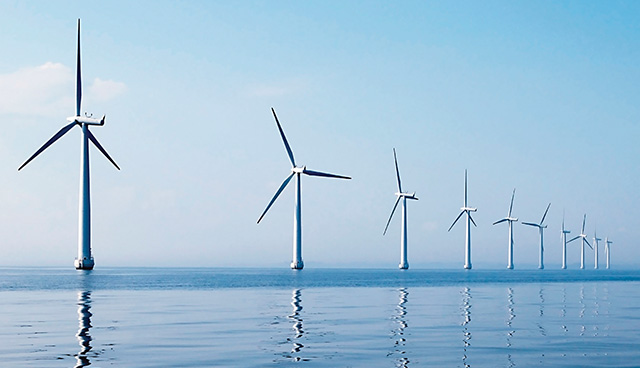
Can we meet our renewable energy targets?
10th November 2017
Optimally allocating renewable generation in Ireland: A long-term outlook until 2050
12th November 2018Ireland’s National Mitigation Plan centred on a commitment to decarbonise energy

Ireland launches its National Mitigation Plan with emissions targets envisaged up to 2050.
The Minister for Communications, Climate Action and Environment, Denis Naughten TD, has published Ireland’s first statutory National Mitigation Plan. Prepared in accordance with the provisions of the Climate Action and Low Carbon Development Act, 2015, the Plan represents an initial step to set Ireland on a pathway to achieve the deep decarbonisation required by mid-century, in line with the Government’s policy objectives. The new strategy contains a series of mitigation measures and actions to address the immediate challenge to 2020 and to prepare for the EU targets that Ireland will take on for 2030. It will also begin the development of work to meet the objectives of the National Policy Position for 2050.
The Plan covers greenhouse gas emissions in the Electricity Generation, Built Environment, Transport, and Agriculture, Forest and Land Use sectors. For each sector, the Plan sets out the sectoral policy context, the greenhouse gas emissions trends for each sector, the opportunities and challenges, mitigation measures currently in place and under development, and specific actions to take forward work within each sector.
Announcing the publication of the Plan Naughten said: “This Plan is the culmination of months of sustained work across government and represents a first step in our ‘whole-of-government’ approach to addressing Ireland’s greenhouse gas emissions. As a country we are playing catch-up on our obligations in relation to climate change. This obligation is as much an opportunity as an obligation. In any event it is a moral necessity and a vital national interest. The work does not end here, however, but rather begins.
“The Plan sets out the full range of measures already being undertaken to reduce our emissions but crucially it also provides the framework for further work that must now be undertaken by government as a whole in the months ahead. On climate change, change is possible. Our role is to put the levers for change into people’s hands.
“This is our work at home, while abroad we stand firm in our commitment to the Paris Agreement. Energy efficiency is central to this plan. This is because using less energy and using it more efficiently is the most cost-effective and accessible way to tackle climate change.”
The National Mitigation Plan provides a robust framework for action and accountability for progress as follows:
A total of 106 distinct actions are included, to be implemented across government in order to advance the national transition agenda. Robust implementation and oversight will be effected through a National Mitigation Plan High Level Steering Group, which will be chaired by Minister Naughten.
“In the context of energy policy, the National Mitigation Plan will be fully aligned with and will build upon commitments made in Ireland’s Energy White Paper.”
Naughten added: “The Plan provides a sustained, considered and strategic approach to incremental and permanent decarbonisation involving all of government and society. Individual ministers will play a key leadership role in driving action year on year and will be directly accountable to the Oireachtas to demonstrate real progress in their sectors to moving Ireland closer to achieving its national transition objective.
“It is the work of politics to bridge the gulf between global challenge and national responsibility, and between Ireland’s obligation and every single citizen’s responsibility. I look forward to working closely with An Taoiseach and my colleagues in Cabinet to lead change effectively.”
In April 2017, the Environmental Protection Agency (EPA) published updated projections of greenhouse gas emissions under two different scenarios (‘with measures’ and ‘with additional measures’) of policy implementation for the period 2016-2035.
The latest EPA figures indicate that, by 2020, Ireland’s emissions are likely to be in the range of 4 to 6 per cent below 2005 levels. This is well short of Ireland’s target of a 20 per cent reduction on 2005 levels, and a deteriorating position, in the context of increasing activity in the economy, when compared to the previous set of EPA projections, published in 2016. Under the EPA’s ‘with measures’ scenario (a business as usual scenario incorporating no new measures after end-2015), Ireland is expected to exceed its obligations by the equivalent of 13.7 million tonnes of CO2 over the 2013-2020 period.
The legislative framework governing the EU’s 2020 emissions reduction targets includes a number of flexibility mechanisms to enable member states to meet their annual emissions targets, including provisions to bank any excess allowances to future years and to trade allowances between member states.
Using banked emissions from the period to 2015, Ireland is projected to comply with its emission reduction targets in each of the years 2013 to 2018. However, cumulative emissions are expected to exceed targets for 2019 and 2020, which will result in a requirement to purchase additional allowances. While this requirement is not, at this stage, expected to be significant, further analysis will be required to quantify the likely costs involved in light of the final amount and the price of allowances required.
Naughten highlighted the significance of the National Mitigation Plan for Ireland, courtesy of his speech to the Energy Ireland conference in June.
He said that energy and climate action are inextricably linked. “Using less energy, and using it more efficiently, is the most cost-effective and accessible way for us all to take action on climate change.
“In the context of energy policy, the National Mitigation Plan will be fully aligned with and will build upon commitments made in Ireland’s Energy White Paper.
“Implementation of the Plan will also be guided by the need to provide a stable and predictable policy and regulatory framework and to ensure that emissions reductions are achieved as cost effectively as possible.”
The Minister also referenced the need for Ireland to pursue the investment, innovation and enterprise opportunities inherent in the transition to a low carbon, climate-resilient and environmentally sustainable economy.
He added: “The long-term decarbonisation required will only be achievable if all of government and all of society play their part and do the right thing.
“It will only be successful if wider society is engaged more generally with the climate challenge, if we can motivate changes to more sustainable behaviour, and create structures at local, regional and national levels to support the generation of ideas and their translation into appropriate cost and climate effective actions.
“That is why I am establishing the National Dialogue on Climate Action. The key objective of the Dialogue is to ensure that wider society is part of an inclusive process of engagement and consensus building aimed at enabling our transformation to a low carbon and climate-resilient future.”
Naughten confirmed that in the context of energy policy, the National Mitigation Plan will be fully aligned with and will build upon commitments made in the Energy White Paper.
He also pointed out that the transition to a low carbon energy system will reduce Ireland’s reliance on fossil fuels.
“However, in the medium-term, the continued secure supply of fossil fuels is a key consideration. It is therefore important to recognise the contribution of indigenous sources of energy to security of supply.
“We have recently seen the impact of the Corrib gas field, where in the space of a year, Ireland went from importing 88 per cent of our energy needs in 2015 to 70 per cent of our energy needs in 2016, a significant turn-around. In fact, according to Gas Networks Ireland’s data, there were a small number of days in 2016, when Ireland did not import any natural gas at all.”
